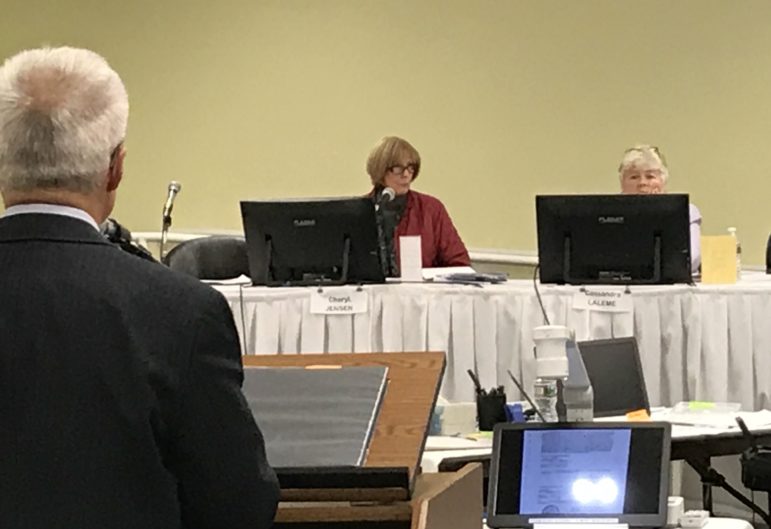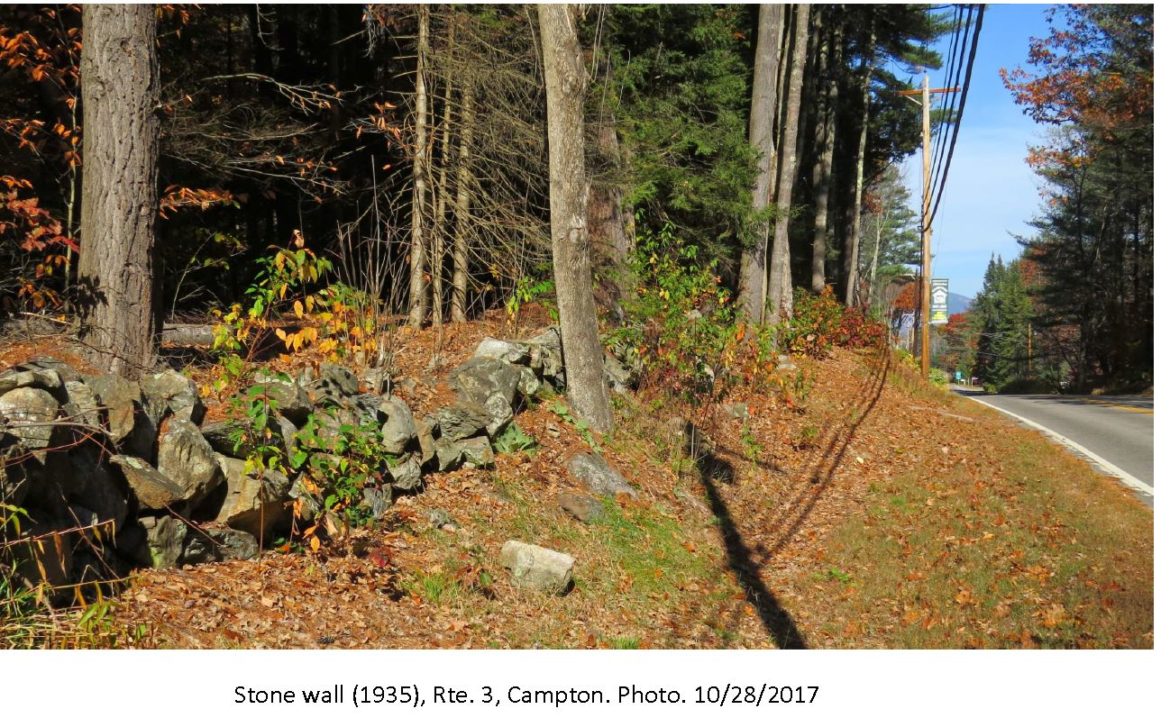Correction – InDepthNH.org’s Wednesday story about Northern Pass should not have said the project’s construction property value loss program wouldn’t cover the underground portion. It said an intervenor said if the project devalues private property, a program would compensate the owner, but no similar situation exists for landowners along the project’s underground route. According to Eversource spokesman Kaitlyn Woods, ‘The project’s construction claims process applies to the entire line. To my knowledge, there has never been any discussion that would indicate that the claims process only applies to overhead lines. The construction claims process, as it relates to the entire line, has been discussed during testimony.’
By GARRY RAYNO, InDepthNH.org
CONCORD — If the Northern Pass overhead transmission project devalues private property, a program would compensate the owner, but no similar situation exists for landowners along the project’s underground route.
“People don’t know where (the underground line is) going,” said Grafton County Commissioner Linda Lauer of Bath, “or what effect it will have on their property, trees, stone walls, flower gardens.”
Lauer told the Site Evaluation Committee Wednesday she needed more detailed plans for her sewer system before she could build her house than Eversource has provided for the $1.6 billion, 192-mile, high-voltage transmission line.
Confusion over the right-of-way boundary leaves abutters wondering what will happen on their land, Lauer said.
Eversource has proposed a property value loss mitigation measure with specific criteria such as the property has to be a single-family home and be within 100 feet of the utility right-of-way, but only applies to the overhead section of the route, not the underground section, said intervenor Susan Schibanoff of Easton.
She said the Department of Transportation issued policy guidelines earlier this year stating stone walls in rural areas increase property values and if they are damaged the owner needs to be compensated.
Schibanoff noted the guidelines state there are four ways to determine the value of a stone wall: the material value, the replacement value, the intangible value and the real estate value.
She asked Lauer if there are stone walls on private property in Grafton County along the buried section in the state right-of-way, and Lauer said there are.
“The applicant has a very specific plan for the overhead route,” Schibanoff said. “Should the applicant have a similar plan for the underground route for stone walls?” she asked and Lauer said there should be a similar plan.
Schibanoff showed a picture of a stone wall along Route 3 in Campton where the line would be buried on the other side of the road.
She said when she was taking the picture the owner told her his grandfather had built the stone wall in 1938.
“How would the DOT compensate the owner for its clear intangible value if it had to be removed?” she asked, but attorney Barry Needleman, representing Eversource, objected to the question saying it was speculation.
The Grafton County Commissioners filed a motion Wednesday seeking a new public hearing on the project and a new application from the developers because they say the scope of the project has been significantly changed and those changes severely affect landowners along the buried section.
The 52-mile section of buried line from Bethlehem to Bridgewater is in Grafton County.
During Wednesday’s hearing, Lauer said she is concerned about the property rights of individuals and businesses along the state right-of-way where the line will be buried, although attorneys for project developer Eversource assured Lauer the line will not harm private property and is required to remain in the right-of-way.
Lauer said the right-of-way boundaries need to be clearly defined so property owners will know. The Department of Transportation this summer required Eversource to better define the right-of-way boundaries and an ongoing plan was developed.
The right-of-way along Route 116 where the line will be buried could be arbitrarily decided in areas where it is unclear, Lauer said, and the only way to challenge that is in court.
“This is a poor area of the state and landowners can’t afford to go to court so they can’t go to court,” she said.

Garry Rayno photo
Attorney Tom Pappas, representing the Counsel for the Public, questions on the left, Cheryl Jensen, a member of the Bethlehem Conservation Commission, and Cassandra Laleme, former Bethlehem selectman during Wednesday’s adjudicative hearing on the Northern Pass Transmission Project.
Transition Station 5
There was also confusion over the location of transition station 5 in Bethlehem where the line will go from overhead to underground.
Bethlehem Conservation Commission member Cheryl Jensen said the town recently learned there is an option to swap land parcels between Eversource and the owner of land where an 80-unit hotel is planned along Route 302.
The option would allow the transition station to be moved to a site where it would be less visible from the proposed hotel, she said. The developer said earlier he would not build the hotel if the station is where it is planned with the towers, Jensen said.
She said the station’s location is different than the one in the Northern Pass application and approved by the Department of Environmental Services.
The new hotel is very important to Bethlehem, Jensen said, because it will provide an estimated $385,000 annually in property taxes to the town.
Yet, she said testimony from Eversource vice president Kenneth Bowes earlier this year, stated the station would be where it was in the plans submitted to the committee.
“I’m confused,” Jensen said.
Attorney Jeremy Walker, representing Eversource, said the land option was signed in the spring and since that time Bowes testified the location would not change.
“There are no planned changes to the transition station location,” Walker said, adding the hotel developer is moving forward with the project.
Former Bethlehem selectman Cassandra Laleme said the developer submitted the land option with his application for the hotel, adding he has received a zoning variance for the height of the building. He is scheduled to appear before the planning board on Nov. 15, Laleme said.
“He is moving forward because he thinks the land swap will take place,” Jensen said. “He thinks the (transition station) is going to be moved.”
Walker said that is speculation, but Jensen said the developer’s representative said without the land swap he wouldn’t go forward when he appeared before the zoning board.
Laleme said everyone would have a better idea of what he is thinking after the planning board meeting later this month.
Committee chair Martin Honigberg asked to have the minutes of the meeting sent to the committee.
Walker said if the town is concerned about additional tax revenue from the new hotel, then the estimated $1.1 million in new taxes from Northern Pass ought to help with what the town wants to do, but the town is opposed to the project.
Increased taxes would assist the town, Laleme said, but “the town made the decision to oppose the project and voted to close the landfill knowing what that would do to the budget.” She said they expect a $3 per $1,000 of valuation jump in the property tax rate.
She would rather see three hotels paying $385,000, Laleme said, because they reflect the town’s tradition of grand hotels.
“What we have in the North Country is a very special place,” she said. “To see a swarth of towers coming down through here takes a great deal away from what that place is. Vernal pools, deer yards or beech trees are gone and we’ll never get them back.”
The adjudicative hearings continue Thursday with town officials from Pembroke.
Eversource had hoped to have all federal and state permits by the end of this year with construction to begin next year and the transmission line finished by the end of 2020.
The Site Evaluation Committee is not expected to make a final decision on the high-voltage transition line until the end of February.
If all permits are received, project officials said earlier, construction could begin in April.
Garry Rayno can be reached at garry.rayno@yahoo.com





